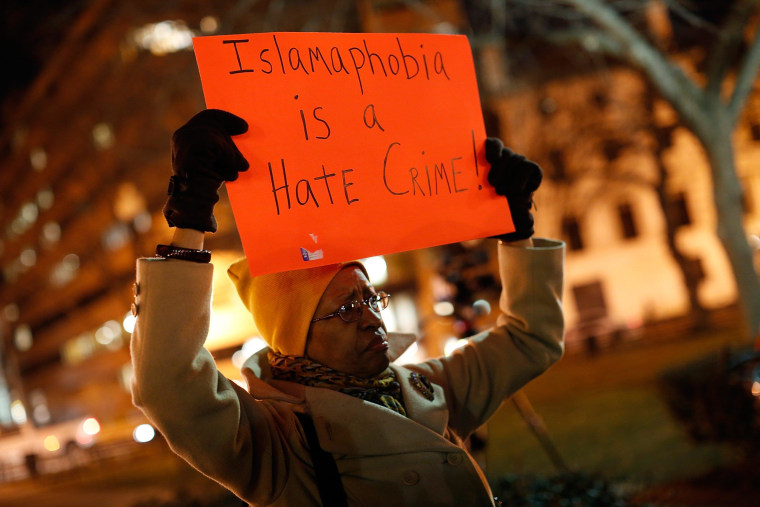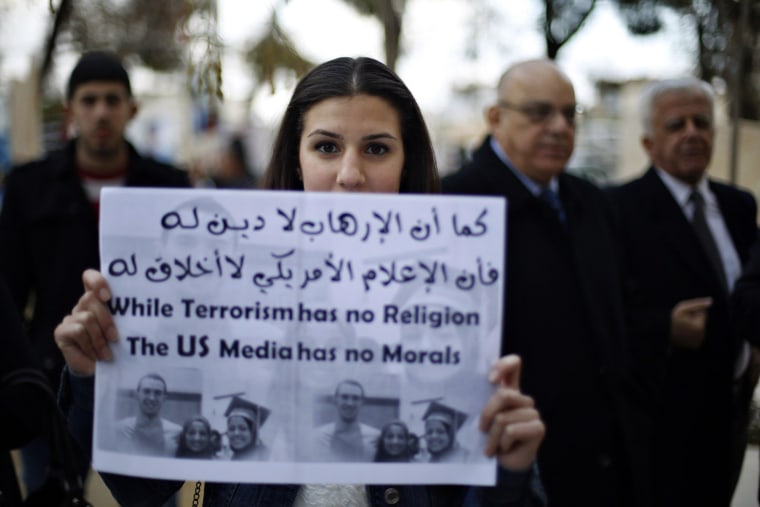As they continue to mourn the loss of the three Chapel Hill shooting victims, leaders of the Arab and Muslim communities are also part of a growing chorus criticizing national media organizations for failing to initially recognize the severity of the crime, and lagging in their coverage from the start.
The Arab American News, one of the leading community newspapers in Dearborn, Michigan, posted a blistering editorial in the aftermath of the shooting, citing the publication of a story by a British newspaper a full five hours before mentions in some major U.S. publications.
Ali Harb, who wrote the editorial, said the murders were like an alarm to the national Arab American community, many of whom were forced to rely on the social media hashtag #muslimlivesmatter, which gained traction overnight as news of the shootings spread, to get information.
“Unfortunately," Harb wrote, "the national mainstream media's apathy about the murder of the students shows that Muslim lives do not matter to the establishment.”
Harb gave the national mainstream media an “F” grade for failing to report the story quick enough. But he conceded that 15 hours later, the coverage warranted a “B” grade, as it picked up in intensity and began focusing on the victims' stories, not just the crime itself.
“The ideal scenario is for it to be reported as breaking national news when it happens,” Harb said to NBC News. “We felt hurt. There isn't a single Arab or Muslim American who didn’t feel attacked [that] day.”
“If this were a case of a middle-aged Arab/Muslim man murdering three young White Christian Americans in their home...we all know that it would have been carried immediately"
Amer Zahr, a writer and adjunct law professor at the University of Detroit also remarked on the lag time in coverage on his blog, “The Civil Arab.” But he was even more concerned by what he called a "clear double standard."
“If this were a case of a middle-aged Arab/Muslim man murdering three young White Christian Americans in their home, shooting them each in the head, we all know that it would have been carried immediately,” Zahr said.

”We live in a country where the top movie glorifies the killing of Arabs and Muslims,” he continued, referencing the film "American Sniper." “People have exited that movie writing terrible hate-filled things about us. A whole generation of young Americans is brought up playing video games where the main objective is killing 'enemies' who look like us. It is this atmosphere of xenophobia and Islamophobia that we live with every day. We are victims of media brutality.”
Khaled Beydoun, 36, an assistant professor at the Barry University Law School in Orlando, and a leader in the National Network of Arab American Communities, says the level of coverage by national media similar to what was seen after the shootings at Sandy Hook Elementary in Connecticut or a theater in Aurora, Colorado would have better served the American audience.
Beydoun says the possibility that the shooting was a hate crime was too quickly dismissed, and fails to recognize a underlying Islamaphobic and anti-Arab “psychosis” in American society, perpetuated and strengthened over a decade of government strategies targeting the community.
“To think the parking dispute isolated - without any additional context - was the principal and exclusive motive for such a heinous crime, to me is really illogical, especially in a broader context,” said Beydoun.
As the FBI opens its own inquiry into the Chapel Hill killings, Beydoun says the media could improve its record with more thoughtful, nuanced and extended conversations and reporting on the community. That kind of coverage, he says, would help people understand why the Chapel Hill shooting happened and could even potentially prevent another incident from occurring.
